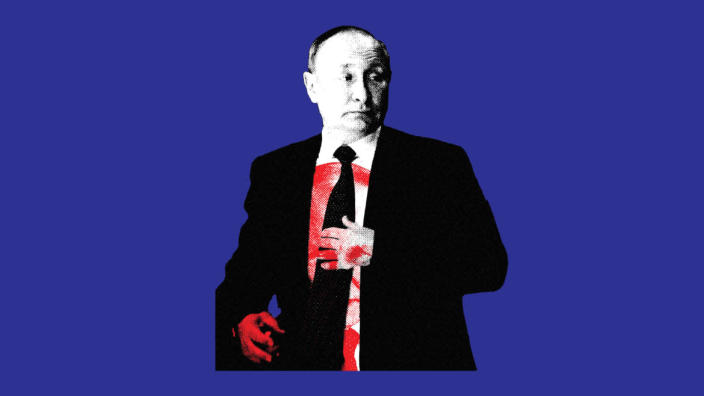
Ukraine recaptured the city of Izium on Saturday, giving hope that the tide might finally be turning decisively against the Russian invaders. Not only are Russian forces in retreat, Vladimir Putin is facing increased criticism at home. There is even evidence of the Kremlin engaging in damage control to manage the domestic narrative.
Still, we should not allow ourselves to be carried away by Ukraine’s recent success. Russia still has cards to play.
In the build-up to the escalation in the south around the Ukrainian city of Kherson, Russia redeployed much of its forces to that region. In the process of doing so, it now appears likely that they left their defensive lines around Kharkiv in the northeast thinly defended. By doing so, a window of opportunity for the Ukrainians opened, which they were able to take advantage of last week.
The amount of success the Ukrainians have accomplished is staggering. All those who despise Putin’s aggressive war of choice can take comfort in their recent victories. But it may not be as decisive as some are claiming.
Just as Russia redeployed its troops to the south, it is almost certainly in the process of reorganizing and redeploying its assets to the Donbas. If Russia’s presence in Kharkiv is to collapse completely, then every Russian unit that successfully withdraws from Kharkiv to the east is an additional fighting force that will lend its aid to the defense of Russia’s gains elsewhere.
Kremlin TV Airs Call for Russia to Admit ‘Serious Defeat’
Frederick the Great once remarked that to defend everything is to defend nothing. Kharkiv, for all its proximity to Kyiv, appears to be the least valuable of Russia’s conquests in Ukraine. While it’s unlikely that Kremlin leaders desire to lose the territory, it would be the territory they would hate to lose the least. It’s also unclear that the Kremlin has given up on maintaining at least part of the region.
As for Ukraine, just how much territory they will be able to reclaim in the weeks and months ahead is still in question. In attrition-heavy, defense-heavy conflicts, it can actually be detrimental to advance too far. Artillery, logistics, and other forms of support will move slower than an advancing army. Unless Ukraine is particularly well prepared for the gains they’ve seen, Ukraine’s advance may well slow at the exact moment when they should be most inclined to press their advantage. Every day Ukraine delays to regroup is also a day Russia has to reorganize.
If Russia can reorganize their defensive lines faster than Ukraine can advance, then the war may once again return to attritive combat.
At the moment, there are still too many unknowns. Perhaps Russia has finally reached the limits of its manpower and munitions. Perhaps there are other avenues for military advance elsewhere along the front lines. Perhaps, finally, Russia is losing its ability to continue the war.
Those are seductive lines of thought, especially because that is what we—as a community who holds unprovoked and unjust wars with contempt and disgust—wish to be true.
Though Russian forces are in retreat and Ukrainians are on the ascendant, we do not have a sufficiently granular understanding of the situation on the ground to make a call one way or the other on the future direction of the war. In June, this author argued that focusing too much on how the conflict will end is only going to cloud our understanding of the war as it is.
Putin Is Dreaming of This Nightmare End to the War
Lawrence Freedman, perhaps one of the greatest living authorities on strategy and conflict, was far more optimistic in his coverage of Ukraine’s recent advance, but he too warned “there is always a risk of analyses getting too far ahead, jumping from the current state of affairs to the next and beyond and then asking what happens in purely hypothetical situations.”
Concern regarding nuclear escalation often falls into that tendency. Earlier in March, The Daily Beast covered the possibility that Russia will engage in increasingly dirty wartime measures in order to stave off defeat. This included the possibility of using nuclear material from captured reactors for wartime purposes. While we must be on guard against the prospect and others like it, especially with Ukraine’s senior military leadership making note of the possibility of limited nuclear war as recently as last week, this all seems premature. Russia will need to be truly desperate for them to pursue such an action.
The fear-contagion hypothesis, likewise, falls into a similar category. This is the idea that defeat is contagious. As Russian troops flee from the front lines, they will spread their demoralization to other fronts. As defeat happens on one front of the war, confidence in other units’ ability to defend their positions will also decline.
To an extent, we’ve seen this story before. After all, early reports of this war were filled with stories of Russian soldiers fleeing, defecting, sabotaging their vehicles, and even killing their superior officers. Some of that was no doubt true, but initial analysis seemed to have exaggerated facts on the ground. Might similar reports we’re seeing now likewise prove to be overblown?
No one knows how this war will end. Until we learn more about the state of Russia’s defenses and of its ability to reorganize its military forces, no one should be convinced that Ukraine’s ultimate victory is in sight.
Get the Daily Beast’s biggest scoops and scandals delivered right to your inbox. Sign up now.
Stay informed and gain unlimited access to the Daily Beast’s unmatched reporting. Subscribe now.




